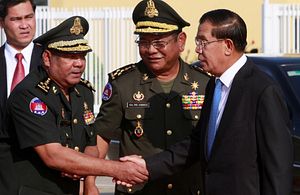PHNOM PENH — Cambodian-American relations hit a new low this week as the U.S. imposed sanctions on the commander of Cambodian Prime Minister Hun Sen’s personal bodyguard unit and for the first time directly implicated the general in a 1997 grenade attack on opposition supporters.
General Hing Bun Hieng was sanctioned for “being the leader of an entity involved in serious human rights abuse,” the U.S. Treasury Department said on Tuesday. The sanctions block any property or interest in property held by the general within U.S. jurisdiction.
The unprecedented sanctions are the first aimed at Hun Sen’s inner circle, potentially paving the way for more as the ruling Cambodian People’s Party (CPP) continues its pursuit of political opponents and outspoken critics, which has included the jailing of the opposition leader Kem Sokha.
But it was one of the alleged human rights abuses that raised most eyebrows.
“Bun Hieng and the PMBU [Prime Minister Bodyguard Unit] have been connected to incidents where military force was used to menace gatherings of protesters and the political opposition going back at least to 1997, including an incident where a U.S. citizen received shrapnel wounds,” the statement said.
On March 30, 1997, at least 16 people were killed when four grenades were tossed into a rally in central Phnom Penh led by Sam Rainsy, then head of the opposition Khmer National Party.
Among more than 150 wounded in the attack was an American named Ron Abney, country director of the International Republican Institute, which prompted an FBI investigation. However, the U.S. ambassador at that time, Kenneth Quinn, ordered the lead investigator out of the country soon after and the investigation was never completed.
Witnesses told investigators from the FBI and United Nations that Hun Sen’s bodyguards allowed the assailants to pass into a compound containing houses of high-ranking CPP officials while blocking at gunpoint crowd members who were pursuing the grenade-throwers.
This week’s statement is the first time the U.S. government has directly implicated a Cambodian official in the attack.
Contacted in France, Sam Rainsy, who escaped in 1997 with minor injuries and is currently in exile to avoid jail over cases widely panned as politically motivated, said the sanctions could have a domino effect spiraling to the very top of the Cambodian government.
“This official recognition of Hing Bun Hieng’s responsibility in this heinous crime will likely have far-reaching implications, starting with the inevitable confirmation of the role of Hun Sen as the only person in a position to give orders to Hing Bun Hieng, the head of his personal bodyguard unit,” he said.
The U.S. Embassy declined to comment.
Sophal Ear, a Cambodia expert and associate professor at Occidental College, Los Angeles, said the significance of the statement should not be downplayed.
“I think it’s huge. He’s not a nobody and to reach into history like that, and link him to the grenade attack as mastermind; whoa, the gloves are off,” he said in an email.
Hing Bun Hieng met the sanctions with sarcasm, telling The Phnom Penh Post that he was “very happy and most satisfied. I’m thankful at the decision by the U.S. to sanction me.”
The Ministry of Foreign Affairs, however, lashed out at the U.S. government, calling the sanctions “a flagrant violation of international principles of sovereign equality and non-interference in the domestic affairs of other states.” On Friday, CPP lawmaker Chheang Vun branded the move “very cheap and unacceptable” in a video uploaded to government mouthpiece Fresh News.
The sanctions illustrate the latest souring in relations between the two governments. The United States warned of ramifications if Hun Sen’s government refused to reinstate the Cambodia National Rescue Party, the only realistic threat to the ruling party in next month’s election, following its dissolution last year over unsubstantiated accusations it was attempting to wage a U.S.-backed revolution.
U.S. Senator John McCain on Thursday tweeted that sanctions against Hing Bun Hieng were a “positive step forward in holding the regime accountable” and that “more designations should come if brutal crackdown on opposition leaders and civil society in Cambodia continues.”
Carl Thayer, a Southeast Asia military expert at the Australian Defence Force Academy, said sanctions would have little effect on the CPP leadership and that the move was mainly symbolic in light of the regime’s increasing pivot towards China.
“Hun Sen has already made the decision to side with China against criticism by the United States and the European Union. Hun Sen has already crossed the proverbial Rubicon by halting military exercises with the United States and taunting the United States to cut all aid to Cambodia,” he said.
“The U.S. has no real leverage on the Hun Sen regime because China will increase support for Cambodia to match U.S. sanctions. If the United States persists in targeted sanctions, Hun Sen might well expel the U.S. Ambassador,” he added.
But Sophal Ear predicted the threat of further sanctions would likely strike fear into the upper echelons of the ruling party.
“There’s nothing they can do but pray and reverse Cambodia’s democratic slide. Behind the condemnation and the sarcasm is fear that they are next. In fact, there’s probably terror and panic as they consider all their ill-gotten assets, bank accounts filled with millions, real estate, and kids’ education,” he said. “Uncle Sam is coming for them.”
George Wright is a freelance journalist based in Phnom Penh.

































